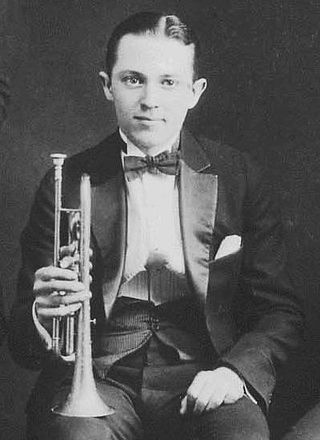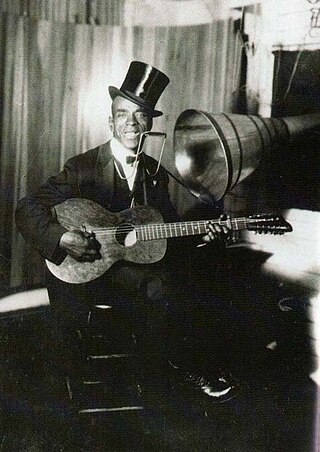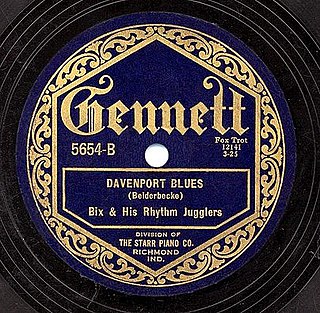Related Research Articles

Leon Bismark "Bix" Beiderbecke was an American jazz cornetist, pianist and composer.

Joseph Nathan "King" Oliver was an American jazz cornet player and bandleader. He was particularly recognized for his playing style and his pioneering use of mutes in jazz. Also a notable composer, he wrote many tunes still played today, including "Dippermouth Blues", "Sweet Like This", "Canal Street Blues", and "Doctor Jazz". He was the mentor and teacher of Louis Armstrong. His influence was such that Armstrong claimed, "if it had not been for Joe Oliver, Jazz would not be what it is today."

The Original Dixieland Jass Band (ODJB) was a Dixieland jazz band that made the first jazz recordings in early 1917. Their "Livery Stable Blues" became the first jazz record ever issued. The group composed and recorded many jazz standards, the most famous being "Tiger Rag". In late 1917, the spelling of the band's name was changed to Original Dixieland Jazz Band.

A jug band is a band employing a jug player and a mix of conventional and homemade instruments. These homemade instruments are ordinary objects adapted to or modified for making sound, like the washtub bass, washboard, spoons, bones, stovepipe, jew's harp, and comb and tissue paper. The term jug band is loosely used in referring to ensembles that also incorporate homemade instruments but that are more accurately called skiffle bands, spasm bands, or juke bands because they do not include a jug player.

Clarence Williams was an American jazz pianist, composer, promoter, vocalist, theatrical producer, and publisher.
Leon Joseph Roppolo was an American early jazz clarinetist, best known for his playing with the New Orleans Rhythm Kings. He also played saxophone and guitar.

OKeh Records is an American record label founded by the Otto Heinemann Phonograph Corporation, a phonograph supplier established in 1916, which branched out into phonograph records in 1918. The name was spelled "OkeH" from the initials of Otto K. E. Heinemann but later changed to "OKeh". Since 1965, OKeh was a subsidiary of Epic Records, a subsidiary of Sony Music. Today, OKeh is a jazz imprint, distributed by Sony Masterworks.

Orie Frank Trumbauer was an American jazz saxophonist of the 1920s and 1930s. His main instrument was the C melody saxophone, a now-uncommon instrument between an alto and tenor saxophone in size and pitch. He also played alto saxophone, bassoon, clarinet and several other instruments.
The Memphis Jug Band was an American musical group active from the mid-1920s to the late-1950s. The band featured harmonica, kazoo, fiddle and mandolin or banjolin, backed by guitar, piano, washboard, washtub bass and jug. They played slow blues, pop songs, humorous songs and upbeat dance numbers with jazz and string band flavors. The band made the first commercial recordings in Memphis, Tennessee, and recorded more sides than any other prewar jug band.
H. C. Speir was an American "talent broker" and record store owner from Jackson, Mississippi. He was responsible for launching the recording careers of most of the greatest Mississippi blues musicians in the 1920s and 1930s. It has been said that, "Speir was the godfather of Delta Blues" and was "a musical visionary". Without Speir, Mississippi's greatest natural resource might have gone untapped."

Joseph Samuels was an American musician and bandleader, who is today virtually only known through his recordings.

Johnny Watson was an American blues singer, guitarist and harmonica player, best known for his recordings under the name Daddy Stovepipe. Watson also recorded as Jimmy Watson, Sunny Jim and Rev. Alfred Pitts. He may have been the earliest-born blues performer to record.

The Wolverines were an American jazz band. They were one of the most successful territory bands of the American Midwest in the 1920s.

Burl C. "Jaybird" Coleman was an American country blues harmonica player, vocalist, and guitarist. He was a popular musical attraction throughout Alabama and recorded several sides in the late 1920s and early 1930s.

"Riverboat Shuffle" is a popular song composed by Hoagy Carmichael, Irving Mills, and Dick Voynow. Lyrics were later added by Carmichael and Mitchell Parish.

Davenport Blues is a 1925 song composed and recorded by Bix Beiderbecke and released as a Gennett 78. The song has become a jazz and pop standard.
"Dippermouth Blues" is a song first recorded by King Oliver's Creole Jazz Band for Gennett Records in April 1923 and for Okeh Records in June of that same year. It is most often attributed to Joe "King" Oliver, though some have argued that Louis Armstrong was in fact the composer. This is partly because "Dippermouth", in the song's title, was a nickname of Armstrong's. Also, the phonograph recordings from 1922 gave credit to Armstrong and Oliver jointly. The song is a strong example of the influence of the blues on early jazz. There is a twelve-bar blues harmonic progression, with frequent bent notes and slides into notes.
The Cincinnati Jug Band was an American jug band formed in Cincinnati, Ohio, in the 1920s. Much of the information concerning the involved musicians' personal background is obscured; however, the group is still remembered for being one of the earliest recorded jug bands of the era. The band recorded various sides for Vocalion, Paramount, and Decca under both the Cincinnati Jug Band and as solo artists, some of which have been preserved in several compilation albums.

American Epic: The Best of the Memphis Jug Band is a compilation album released to accompany the award-winning American Epic documentary film series. It collects performances from the Memphis Jug Band's career-spanning recording sessions for Victor Records and OKeh Records between 1927 and 1934. The album was released as a 15-track download and a vinyl LP.
The Chocolate Dandies was the name of several American jazz combos from 1928 through the 1940s. The name was an outgrowth of the Broadway production, The Chocolate Dandies, that debuted in 1924.
References
- ↑ Komara, Edward; Lee, Peter (2004). The Blues Encyclopedia. Routledge. p. 934. ISBN 9781135958329.
- ↑ "Stovepipe No. 1". id.loc.gov. Retrieved November 26, 2022.
- 1 2 Eagle, Bob L.; LeBlanc, Eric S. (2013). Blues: A Regional Experience. ABC-CLIO. p. 137. ISBN 9780313344244.
- 1 2 3 4 5 6 7 8 9 10 11 12 13 14 Tracy, Stephen C. (1998). Going to Cincinnati: A History of the Blues in the Queen City. University of Illinois Press. pp. 8–33. ISBN 978-0252067099.
- ↑ Nelson, Scott Reynolds (2006). Steel Drivin' Man: John Henry, The Untold Story of an American Legend. University of Illinois Press. p. 122. ISBN 978-0198041047.
- ↑ Taft, Michael (2013). Talkin' to Myself: Blues Lyrics, 1921-1942. Routledge. p. 345. ISBN 978-1136734014.
- ↑ Uncle Dave Lewis. "Allmusic Biography". AllMusic . Retrieved 2017-11-04.
- ↑ Pat Missin. "Pre War Blues Harp Greats - Stovepipe No. 1" . Retrieved 2017-11-04.
- 1 2 3 4 Black Recording Artists, 1877–1926: An Annotated Discography. McFarland. 2012. ISBN 978-1476600857.